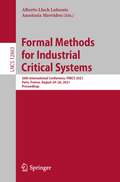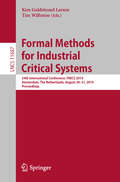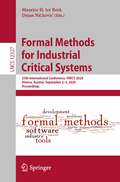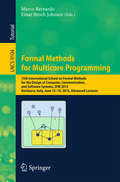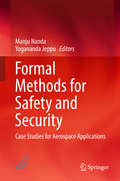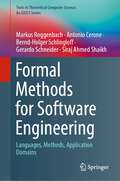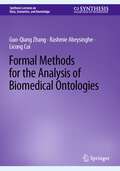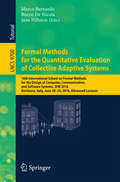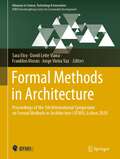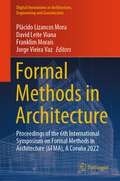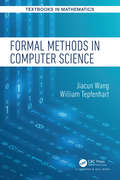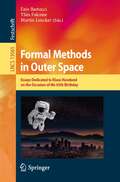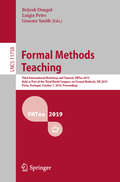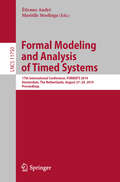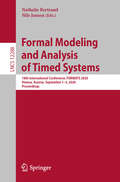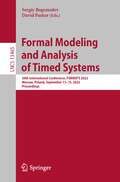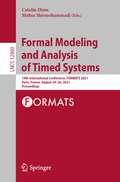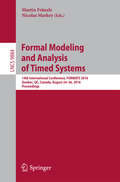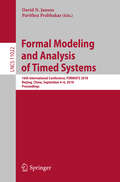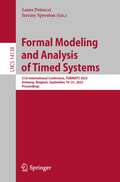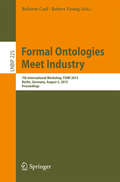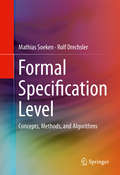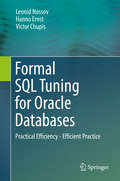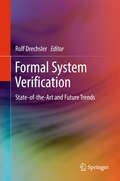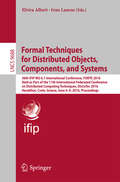- Table View
- List View
Formal Methods for Industrial Critical Systems: 26th International Conference, FMICS 2021, Paris, France, August 24–26, 2021, Proceedings (Lecture Notes in Computer Science #12863)
by Alberto Lluch Lafuente Anastasia MavridouThis book constitutes the proceedings of the 26th International Workshop on Formal Methods for Industrial Critical Systems, FMICS 2021, which was held during August 24-26, 2021. The conference was planned to take place in Pairs, France. Due to the COVID-19 pandemic it changed to a virtual event. The 10 full papers and 6 short papers presented in this volume were carefully reviewed and selected from 31 submissions. The papers are organized in topical sections as follows: Verification, Program Safety and Education, (Event-)B Modeling and Validation, Formal Analysis, Tools, Test Generation and Probabilistic Verification.
Formal Methods for Industrial Critical Systems: 24th International Conference, FMICS 2019, Amsterdam, The Netherlands, August 30–31, 2019, Proceedings (Lecture Notes in Computer Science #11687)
by Kim Guldstrand Larsen Tim WillemseThis book constitutes the proceedings of the 24th International Conference on Formal Methods for Industrial Critical Systems, FMICS 2019, held in Amsterdam, The Netherlands, in August 2019. The 9 regular papers presented in this volume were carefully reviewed and selected from 15 submissions. The conference also featured invited talks by Jaco van de Pol (Aarhus University, and Twente University), jointly with CONCUR, and Holger Hermanns (Universität des Saarlandes) and a special session on (commercial) formal methods in industry. The aim of the FMICS conference series is to provide a forum for researchers who are interested in the development and application of formal methods in industry. In particular, FMICS brings together scientists and engineers who are active in the area of formal methods and interested in exchanging their experiences in the industrial usage of these methods. The FMICS conference series also strives to promote research and development for the improvement of formal methods and tools for industrial applications.
Formal Methods for Industrial Critical Systems: 25th International Conference, FMICS 2020, Vienna, Austria, September 2–3, 2020, Proceedings (Lecture Notes in Computer Science #12327)
by Maurice H. ter Beek Dejan NičkovićThis book constitutes the proceedings of the 25th International Workshop on Formal Methods for Industrial Critical Systems, FMICS 2020, which was held during September 2-3, 2020. The conference was planned to take place in Vienna, Austria. Due to the COVID-19 pandemic it changed to a virtual event.The 11 full papers presented in this volume were carefully reviewed and selected from 26 submissions. The papers are organized in topical sections as follows: Quantitative Analysis and Cyber-Physical Systems, Formal Verification of Industrial Systems, Temporal Logic and Model Checking. The book also contains a lengthy report on a Formal Methods Survey conducted on occasion of the 25th edition of the conference.
Formal Methods for Multicore Programming
by Einar Broch Johnsen Marco BernardoThis book presents 5 tutorial lectures given by leading researchers at the 15th edition of the International School on Formal Methods for the Design of Computer, Communication and Software Systems, SFM 2015, held in Bertinoro, Italy, in June 2015. SFM 2015 was devoted to multicore programming and covered topics such as concurrency and coordination mechanisms, architecture and memory models and type systems.
Formal Methods for Safety and Security
by Manju Nanda Yogananda JeppuThis volume is the outcome of deliberations on formal methods in aerospace. The book specially delves into the use of formal methods for verification, validation, and optimization of software in safety critical and time critical applications, such as those in aerospace engineering. The chapters in this book are authored by leading corporate and government R&D scientists. The contents of this book will be useful to researchers and professionals alike.
Formal Methods for Software Engineering: Languages, Methods, Application Domains (Texts in Theoretical Computer Science. An EATCS Series)
by Antonio Cerone Siraj Ahmed Shaikh Markus Roggenbach Gerardo Schneider Bernd-Holger SchlingloffSoftware programs are formal entities with precise meanings independent of their programmers, so the transition from ideas to programs necessarily involves a formalisation at some point. The first part of this graduate-level introduction to formal methods develops an understanding of what constitutes formal methods and what their place is in Software Engineering. It also introduces logics as languages to describe reasoning and the process algebra CSP as a language to represent behaviours. The second part offers specification and testing methods for formal development of software, based on the modelling languages CASL and UML. The third part takes the reader into the application domains of normative documents, human machine interfaces, and security. Use of notations and formalisms is uniform throughout the book. Topics and features: Explains foundations, and introduces specification, verification, and testing methods Explores various application domains Presents realistic and practical examples, illustrating concepts Brings together contributions from highly experienced educators and researchers Offers modelling and analysis methods for formal development of software Suitable for graduate and undergraduate courses in software engineering, this uniquely practical textbook will also be of value to students in informatics, as well as to scientists and practical engineers, who want to learn about or work more effectively with formal theories and methods. Markus Roggenbach is a Professor in the Dept. of Computer Science of Swansea University. Antonio Cerone is an Associate Professor in the Dept. of Computer Science of Nazarbayev University, Nur-Sultan. Bernd-Holger Schlingloff is a Professor in the Institut für Informatik of Humboldt-Universität zu Berlin. Gerardo Schneider is a Professor in the Dept. of Computer Science and Engineering of University of Gothenburg. Siraj Ahmed Shaikh is a Professor in the Institute for Future Transport and Cities of Coventry University.
Formal Methods for the Analysis of Biomedical Ontologies (Synthesis Lectures on Data, Semantics, and Knowledge)
by Guo-Qiang Zhang Rashmie Abeysinghe Licong CuiThe book synthesizes research on the analysis of biomedical ontologies using formal concept analysis, including through auditing, curation, and enhancement. As the evolution of biomedical ontologies almost inevitably involves manual work, formal methods are a particularly useful tool for ontological engineering and practice, particularly in uncovering unexpected "bugs" and content materials. The book first introduces simple but formalized strategies for discovering undesired and incoherent patterns in ontologies before exploring the application of formal concept analysis for semantic completeness. The book then turns to formal concept analysis, a classical approach used in the mathematical treatment of orders and lattices, as an ontological engineering principle, focusing on the structural property of ontologies with respect to its conformation to lattice or not (non-lattice). The book helpfully covers the development of more efficient algorithms for non-lattice detection and extraction required by exhaustive lattice/non-lattice analysis. The book goes on to highlight the power and utility of uncovering non-lattice structure for debugging ontologies and describes methods that leverage the linguistic information in concept names (labels) for ontological analysis. It also addresses visualization and performance evaluation issues before closing with an overview and forward-looking perspectives on the field. This book is intended for graduate students and researchers interested in biomedical ontologies and their applications. It can be a useful supplement for courses on knowledge representation and engineering and also provide readers with a reference for related scientific publications and literature to assist in identifying potential research topics. All mathematical concepts and notations used in this book can be found in standard discrete mathematics textbooks, and the appendix at the end of the book provides a list of key ontological resources, as well as annotated non-lattice and lattice examples that were discovered using the authors' methods, demonstrating how "bugs are fixed" by converting non-lattices to lattices with minimal edit changes.
Formal Methods for the Quantitative Evaluation of Collective Adaptive Systems
by Marco Bernardo Rocco De Nicola Jane HillstonThis book presents 8 tutorial lectures given by leading researchers at the 16th edition of the International School on Formal Methods for the Design of Computer, Communication and Software Systems, SFM 2016, held in Bertinoro, Italy, in June 2016. SFM 2016 was devoted to the Quantitative Evaluation of Collective Adaptive Systems and covered topics such as self-organization in distributed systems, scalable quantitative analysis, spatio-temporal models, and aggregate programming.
Formal Methods in Architecture: Proceedings of the 5th International Symposium on Formal Methods in Architecture (5FMA), Lisbon 2020 (Advances in Science, Technology & Innovation)
by Sara Eloy David Leite Viana Franklim Morais Jorge Vieira VazThis edited book gathers research studies presented at the 5th International Symposium on Formal Methods in Architecture (5FMA), Lisbon 2020. Studies focus on the use of methodologies, especially those that have witnessed recent developments, that stem from the mathematical and computer sciences and are developed in a collaborative way with architecture and related fields. This book constitutes a contribution to the debate and to the introduction of new methodologies and tools in the mentioned fields that derive from the application of formal methods in the creation of new explicit languages for problem-solving in architecture and urbanism. It adds valuable insight into the development of new practices solving identified societal problems and promoting the digital transformation of institutions in the mentioned fields. The primary audience of this book will be from the fields of architecture, urban planning, civil engineering, AEC, landscape design, computer sciences and mathematics, both academicians and professionals.
Formal Methods in Architecture: Proceedings of the 6th International Symposium on Formal Methods in Architecture (6FMA), A Coruña 2022 (Digital Innovations in Architecture, Engineering and Construction)
by Plácido Lizancos Mora David Leite Viana Franklim Morais Jorge Vieira VazThis book comprises the select proceedings of the 6th International Symposium on Formal Methods in Architecture (6FMA), A Coruña 2022. The contents focus on the use of methodologies, especially those that have witnessed recent developments stemming from mathematical and computer sciences and are developed in a collaborative way with architecture and related fields. This book constitutes a contribution to the debate and to the introduction of new methodologies and tools in the mentioned fields that derive from the application of formal methods in the creation of new explicit languages for problem-solving in architecture and urbanism. Some of the themes in the book are CAD and BIM, mixed realities, photogrammetry and 3D scan, architectural design automation, urban and building performance analysis, SCAVA-space configuration, accessibility and visibility analysis. This book proves a valuable resource for those in academia and industry.
Formal Methods in Computer Science (Textbooks In Mathematics Ser.)
by Jiacun WangThis textbook gives students a comprehensive introduction to formal methods and their application in software and hardware specification and verification. It has three parts: The first part introduces some fundamentals in formal methods, including set theory, functions, finite state machines, and regular expressions. The second part focuses on logi
Formal Methods in Outer Space: Essays Dedicated to Klaus Havelund on the Occasion of His 65th Birthday (Lecture Notes in Computer Science #13065)
by Ezio Bartocci Yliès Falcone Martin LeuckerThis Festschrift, dedicated to Klaus Havelund on the occasion of his 65th birthday, celebrated in 2021 due to the COVID-19 pandemic, contains papers written by many of his closest friends and collaborators.After work as a software programmer in various Danish companies, Klaus has held research positions at various institutes, including the Danish Datamatics Center, the Ecole Polytechnique, LIP 6 lab in Paris, Aalborg University, and NASA Ames. Since 2006 he has been working in NASA’s Jet Propulsion Laboratory (JPL), the federally funded center managed by Caltech whose primary function is to construct and operate planetary robotic spacecraft. His professional awards include the Turning Goals Into Reality engineering innovation award, the Outstanding Technology Development award, and the JPL Mariner, Ranger, Voyager, and Magellan awards. Klaus has provided constant and generous service to the formal methods community by organizing, participating in, and chairing numerous committees. His academic awards include the 2020 SIGSOFT Impact Paper Award, the RV 2018 Test of Time award, and the ASE 2014 and ASE 2016 Most Influential Paper awards. His research activities have generated more than 100 publications with more than 100 collaborators, cited over 12,000 times. The book title reflects Klaus’s main research and engineering focus throughout his career: formal methods, often applied at NASA. The contributions, which went through a peer-review process, cover a wide spectrum of the topics related to his scientific interests, including programming language design, static analysis, runtime verification, dynamic assurance, and automata learning.
Formal Methods Teaching: Third International Workshop and Tutorial, FMTea 2019, Held as Part of the Third World Congress on Formal Methods, FM 2019, Porto, Portugal, October 7, 2019, Proceedings (Lecture Notes in Computer Science #11758)
by Brijesh Dongol Luigia Petre Graeme SmithThis book constitutes the refereed proceedings of the Third International Workshop and Tutorial, FMTea 2019, Held as Part of the Third World Congress on Formal Methods, FM 2019, Porto, Portugal, October 2019. The 14 full papers presented together with 3 abstract papers were carefully reviewed and selected from 22 submissions. The papers are organized in topical sections named: Tutorial lectures; Teaching Program Verification; Teaching Program Development; and Effective Teaching Techniques.
Formal Modeling and Analysis of Timed Systems: 17th International Conference, FORMATS 2019, Amsterdam, The Netherlands, August 27–29, 2019, Proceedings (Lecture Notes in Computer Science #11750)
by Étienne André Mariëlle StoelingaThis book constitutes the refereed proceedings of the 17th International Conference on Formal Modeling and Analysis of Timed Systems, FORMATS 2019, held in Amsterdam, The Netherlands, in August 2019.The 15 full papers and 2 short papers presented in this volume were carefully reviewed and selected from 42 submissions. The papers are organized in the following topical sections: special session on data-driven and stochastic approaches to real-time, including monitoring and Big Data; timed systems; linear and non-linear systems; timed automata; special session on timed systems and probabilities.
Formal Modeling and Analysis of Timed Systems: 18th International Conference, FORMATS 2020, Vienna, Austria, September 1–3, 2020, Proceedings (Lecture Notes in Computer Science #12288)
by Nathalie Bertrand Nils JansenThis book constitutes the refereed proceedings of the 18th International Conference on Formal Modeling and Analysis of Timed Systems, FORMATS 2020, held in Vienna, Austria, in September 2020. The 16 full papers and 2 short papers presented in this volume were carefully reviewed and selected from 42 submissions. The papers focus on topics such as foundations and semantics, methods and tools, techniques, algorithms, data structures, and software tools for analyzing timed systems and resolving temporal constraints.Due to the Corona pandemic this conference was held as a virtual event.
Formal Modeling and Analysis of Timed Systems: 20th International Conference, FORMATS 2022, Warsaw, Poland, September 13–15, 2022, Proceedings (Lecture Notes in Computer Science #13465)
by Sergiy Bogomolov David ParkerThis book constitutes the refereed proceedings of the 20th International Conference on Formal Modeling and Analysis of Timed Systems, FORMATS 2022, held in Warsaw, Poland, in September 2022. The 12 full papers together with 2 short papers that were carefully reviewed and selected from 30 submissions are presented in this volume with 3 full-length papers associated with invited/anniversary talks. The papers focus on topics such as modelling, design and analysis of timed computational systems. The conference aims in real-time issues in hardware design, performance analysis, real-time software, scheduling, semantics and verification of real-timed, hybrid and probabilistic systems.
Formal Modeling and Analysis of Timed Systems: 19th International Conference, FORMATS 2021, Paris, France, August 24–26, 2021, Proceedings (Lecture Notes in Computer Science #12860)
by Catalin Dima Mahsa ShirmohammadiThis book constitutes the refereed proceedings of the 19th International Conference on Formal Modeling and Analysis of Timed Systems, FORMATS 2021, held in Paris, France, in August 2021.The 8 full papers that were carefully reviewed and selected from 19 submissions are presented in this volume with 2 invited talks. The papers focus on topics such as probabilistic computation, logic and verification, robotic planning, complexity of timed pattern matching, safety violations in real-time systems, modal and temporal logics, and others.
Formal Modeling and Analysis of Timed Systems
by Martin Fränzle Nicolas MarkeyThis book constitutes the refereed proceedings of the 14th International Conference on Formal Modeling and Analysis of Timed Systems, FORMATS 2016, held in Quebec, QC, Canada, in August 2016. The 14 papers presented in this volume were carefully reviewed and selected from 32 initial submissions. They are organized in topical sections entitled: modeling timed phenomena; stochasticity and hybrid control; real-time verification and synthesis; workload analysis.
Formal Modeling and Analysis of Timed Systems: 16th International Conference, FORMATS 2018, Beijing, China, September 4–6, 2018, Proceedings (Lecture Notes in Computer Science #11022)
by David N. Jansen Pavithra PrabhakarThis book constitutes the refereed proceedings of the 16th International Conference on Formal Modeling and Analysis of Timed Systems, FORMATS 2018, held in Beijing, China, in September 2018. The 14 papers presented in this volume were carefully reviewed and selected from 29 submissions. The papers are organized in the following topical sections: invited papers, temporal logics, distributed timed systems, behavioral equivalences, timed words, and continuous dynamical systems. The aim of FORMATS is to promote the study of fundamental and practical aspects of timed systems, and to bring together researchers from different disciplines that share interests in modeling and analysis of timed systems and, as a generalization, hybrid systems.
Formal Modeling and Analysis of Timed Systems: 21st International Conference, FORMATS 2023, Antwerp, Belgium, September 19–21, 2023, Proceedings (Lecture Notes in Computer Science #14138)
by Laure Petrucci Jeremy SprostonThis book constitutes the refereed proceedings of the 21st International Conference on Formal Modeling and Analysis of Timed Systems, FORMATS 2023, held in Antwerp, Belgium, in September 2023. The 9 full papers presented in this book were carefully reviewed and selected from 21 submissions. The proceedings also contain one invited paper in full paper length. The papers deal with real-time issues in hardware design, performance analysis, real-time software, scheduling, semantics, and verification of real-timed, hybrid, and probabilistic systems.
Formal Ontologies Meet Industry
by Roberta Cuel Robert YoungThis book constitutes the proceedings of the 7th International Formal Ontologies Meet Industries Workshop held in Berlin, Germany, in August 2015. The 11 full research papers accepted for FOMI 2015 were selected from 18 submissions. The papers focus on theoretical studies of formal ontologies committed to provide a sound basis for industrial applications and to allow formal representation of corporate knowledge, and on business experiences in case studies that single out concrete problems and possible solutions in the creation and deployment of formal ontologies. Overall, they provide valuable insights into the current state of progress in supporting industrial information and knowledge sharing through the development of formal ontologies.
Formal Specification Level
by Mathias Soeken Rolf DrechslerThis book introduces a new level of abstraction that closes the gap between the textual specification of embedded systems and the executable model at the Electronic System Level (ESL). Readers will be enabled to operate at this new, Formal Specification Level (FSL), using models which not only allow significant verification tasks in this early stage of the design flow, but also can be extracted semi-automatically from the textual specification in an interactive manner. The authors explain how to use these verification tasks to check conceptual properties, e. g. whether requirements are in conflict, as well as dynamic behavior, in terms of execution traces.
Formal SQL Tuning for Oracle Databases
by Leonid Nossov Hanno Ernst Victor ChupisThe target of SQL tuning is the improvement of the existing execution plan. The authors discuss the removal of brakes in the execution plan. Such "brakes" or bottlenecks can be recognized by a formal analysis of the execution plan. For this purpose no data model knowledge is needed. This is especially beneficial for database administrators because they are usually not or insufficiently familiar with the data model. The book presents numerous practical examples with this method.
Formal System Verification
by Rolf DrechslerThis book presents the lecture notes of the 1st Summer School on Methods and Tools for the Design of Digital Systems, 2015, held in Bremen, Germany. The topic of the summer school was devoted to modeling and verification of cyber-physical systems. This covers several aspects of the field, including hybrid systems and model checking, as well as applications in robotics and aerospace systems. The main chapters have been written by leading scientists, who present their field of research, each providing references to introductory material as well as latest scientific advances and future research directions. This is complemented by short papers submitted by the participating PhD students.
Formal Techniques for Distributed Objects, Components, and Systems
by Elvira Albert Ivan LaneseThis book constitutes the proceedings of the 36th IFIP WG 6. 1 International Conference on Formal Techniques for Distributed Objects, Components, and Systems, FORTE 2016, held in Heraklion, Crete, Greece, in June 2016, as part of the 11th International Federated Conference on Distributed Computing Techniques, DisCoTec 2016. The 18 revised full papers presented were carefully reviewed and selected from 44 submissions. The papers present a wide range of topics on distributed computing models and formal specification, testing, and verification methods.
